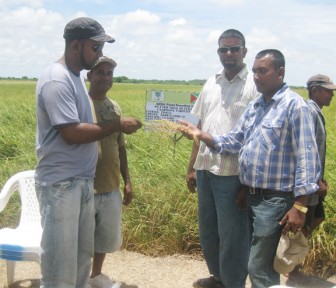Farmers have been testing new lines/candidate varieties of rice for this crop and were reminded that they can only achieve good yields if they work hard and have good agronomic practices.
At a Farmers’ Field School held at Bath, West Coast Berbice last week which comprised farmers from around the country they shared their opinions and observations about the new varieties which would soon be officially released.
Dr Mahendra Persaud, plant breeder at the Rice Research Station at Burma, Mahaicony who worked along with the farmers said that “after these [30-day] trials the full details of what went on would be documented and disseminated…”

Jagnarine Singh, General Manager of the Guyana Rice Development Board
(GRDB) said the new lines are higher yielding than the current varieties.
He said the research station is working on bringing out new lines every year. This comes along with a management practices package that includes guidelines on seed rates, sowing methods and the best disease management.
The event was held close to a field belonging to a farmer, Badesh, where the testing was also being carried out. Feedback from the farmers was that the new lines seemed “promising.”
They also look forward for the GRDB to bring out yields that would help to become more successful farmers.
They noted too that in a “world where the cost of production keeps climbing every day we have to look for higher yielding varieties to cover our expenses.”
A farmer of Bush Lot, Zaid Rafeeoodeen acknowledged though that “high yielding variety is not the end to being a good farmer but we must adapt some of the new technologies.” He noted that farmers have been faced with the demand for more rice.
General Secretary of the Rice Producers’ Association (RPA), Dharamkumar Seeraj said “farmers are increasingly more aware now of growing rice in a more scientific way.”
He said the word is spreading through the field school activities among all generation of farmers. “It is no longer a matter of just sowing and applying fertilizer and harvesting… farmers have to respond to those needs in a scientific way so that they can realize the full potential of the plant itself.”
The good news, he said is that “more and more farmers are buying into the technology and accepting the concept of scientific farming so that they can improve their quality and ultimately their standard of living.”
According to him the RPA and the GRDB have been pushing this concept for quite a while and that the best vehicle to take that message to farmers is through the field schools.




